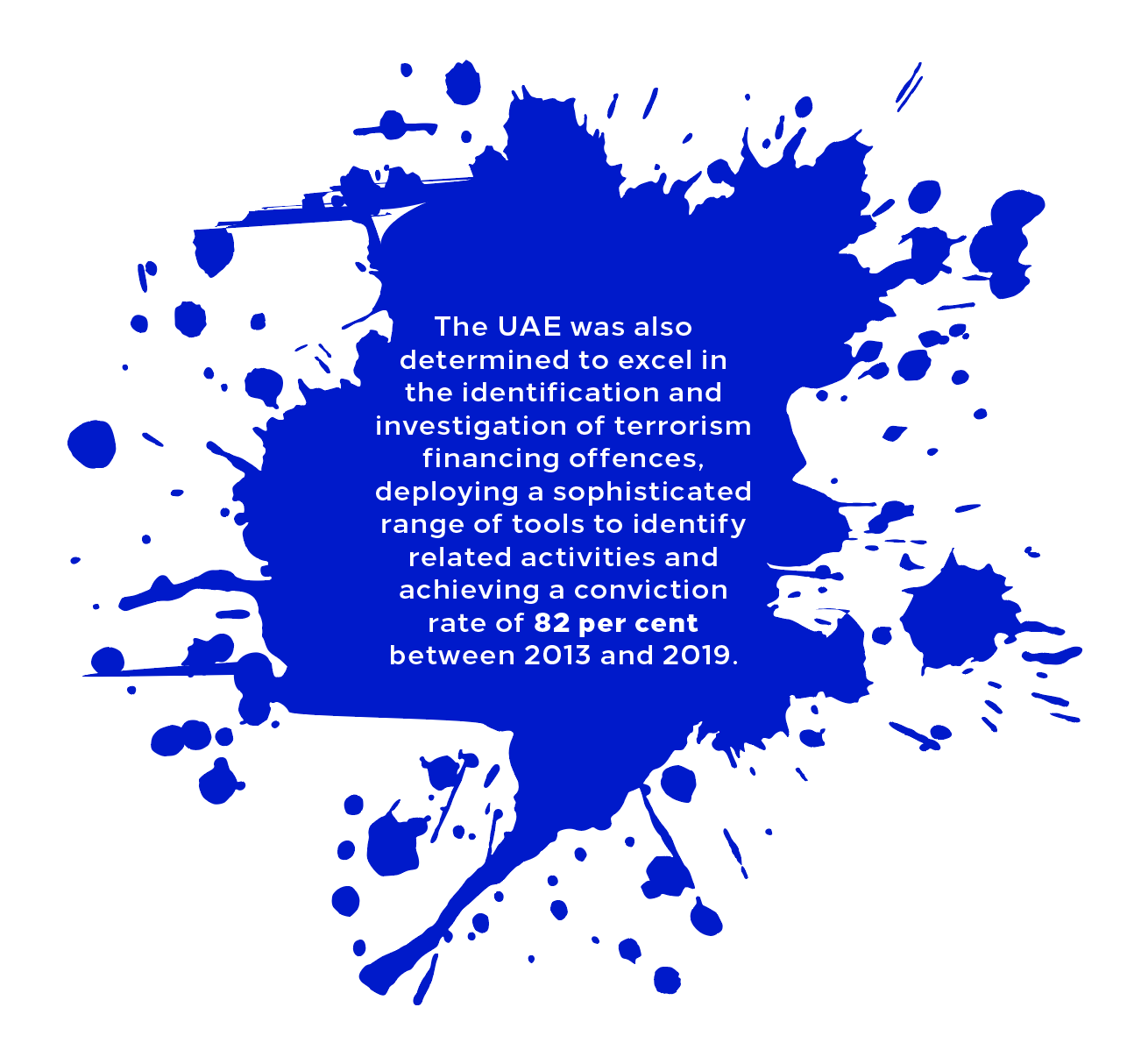Showing Its True Colours: Rising to the Challenge After the UAE’s FATF Mutual Evaluation Report 2020
Ibtissem Lassoued - Partner, Co-head of Compliance, Investigations and White-Collar Crime - Compliance, Investigations and White-Collar Crime / Family Business
Florence Jerome-Ball
Reverberations that bounced around critical circles following the publication of the Financial Action Task Force (‘FATF’) Mutual Evaluation Report (‘Report’) on the United Arab Emirates’ (‘UAE’) sounded clear alarm bells for proponents of the UAE’s legal system. Despite the actions of the authorities and stakeholders to intensify the national Anti-Money Laundering and Counter Terrorism Financing (‘AML/CTF’) framework, critics of the UAE were quick to paint an excoriating picture of the findings, in some cases obscuring the nuances of the report with broad brush conclusions. Whilst the Report undoubtedly calls for invigorated measures to address key deficiencies, closer inspection of the findings shows that there is more light and shade to the assessment that needs to be accounted for. The areas of achievement and challenge illuminated by the FATF carry equal potential to inform the UAE in its next steps to vitalise its AML/CTF defences.
Matters of Perspective
David Lewis, the Executive Secretary of the FATF remarked to the International Consortium of Investigative Journalists in May 2020 that no country has a report that is “something to be proud of”, referring to the less than positive status of the AML/CTF campaign at a global level. According to the UN Office of Drugs and Crime (‘UNODC’), approximately 2-5 per cent of global GDP is laundered on an annual basis, equivalent to US$ 800 billion – US$ 2 trillion. Contextualised in this way, the unforgiving portrait of the UAE proffered by critics is mitigated to a more proportionate level. The UAE is just one part in a much larger system that needs widespread recalibration in order to be effective.
Trials faced by the UAE authorities in AML/CTF are further elucidated when situated against the backdrop of its unique risk profile. The national population is approximately 9.3 million, but the expatriate contingent accounts for more than 88 per cent of this number, making the UAE a very porous system in terms of both money and people. Significant financial outflows made up of remittances carry high risks for money laundering which are further exacerbated by the historic use of informal financing networks amongst large migrant communities. The geographical situation of the UAE is also notable; effectively nestled in an area of the world that is peppered with conflict zones, all of which bring unequivocally higher risks of money laundering and terrorism financing, brought about by frequent crime and violence. The UAE has regional proximity to several countries, including Iran and Syria, that are regularly flagged as high-risk jurisdictions for AML/CTF, which can seep into neighbouring countries. Numerous other factors, including there being no income tax levied against the population, and the complexity of the commercial structures of the UAE, can also have an adverse effect on the risk environment. Across the seven Emirates the country is home to two Financial Free Zones (‘FFZ’), 29 Commercial Free Zones (‘CFZ’), and 39 registries, all operating with regulatory systems that feature significant disparities (driven in part by the pursuit of commercial differentiation). All of these factors create elevated risk for the UAE and it is unlikely that any of these features will abate in the near future. In addition to these persistent factors, the UAE authorities also need to contend with developmental trends that are introducing new facets of risk, such as advanced digitalisation and adoption of new technology.
Viewed in this light, it is easier to appreciate the significance of any extolled progress achieved by the UAE authorities in the ongoing fight against money laundering and terrorism financing. Forward momentum that is gained, inch by inch, gives valuable insight into effective modes of action, and can prove instructive for subsequent strategies centred on addressing the deficiencies identified in other areas.
 Mixed Hues – Main Findings of the Report
Mixed Hues – Main Findings of the Report
The UAE last underwent the full Mutual Evaluation process with onsite visits in 2008, but risks, legislation, threats and context develop quickly in financial crime and twelve years is a veritable lifetime in the cycle of AML/CTF. The Report clearly indicates that the UAE has not been idle in this time, and has made significant improvements to its systems, particularly in the last few years. Some of the most notable improvements include building out a National Risk Assessment and introducing sweeping new legislation in the form of Federal Decree No. 20 of 2018 on Anti-Money Laundering and Counter-Terrorism Financing (‘AML Law’) and its implementing regulations, Cabinet Resolution No. 10 of 2019 (‘Implementing Regulations’), which have brought significant advancement in several areas. Aside from legislative standards, the UAE was also determined to excel in the identification and investigation of terrorism financing offences, deploying a sophisticated range of tools to identify related activities and achieving a conviction rate of 82 per cent between 2013 and 2019, demonstrating acute effectiveness in this area. In a further area of terrorism financing-related defence, the UAE was also determined to have applied effective protection to the non-profit and charitable sector, which is particularly vulnerable to abuse by terrorist organisations; all fundraising practices are tightly controlled in the UAE in order to prevent corruption of altruistic initiatives, including emerging trends such as the use of social media to solicit funds for specific causes.
Counterpoised to these positive affirmations however, there is no escaping that the Report also raised several areas that require significant improvement. International co-operation, access to beneficial ownership information, elements of investigation and prosecution of money laundering offences and implementation of targeted financial sanctions were all identified as areas of deficiency for various reasons. More specific criticisms such as the: insufficient use of financial intelligence; lack of enforcement action; and inadequate focus on high risk sectors such as real estate and precious metals and stones dealers were also cited as weaknesses in the supervisory network. The UAE authorities will face intense pressure to improve their capabilities in these areas as soon as possible.
Deficiencies that are identified in the Report are not always a straightforward demarcation of failure. The implementation of targeted financial sanctions in the UAE is an area that, befittingly, typifies the complexity of assessing the strength of the legislative framework. Under the AML Law and its Implementing Regulations, a new mechanism for designating individuals and entities identified both through domestic structure and United Nations Security Council Resolutions (‘UNSCRs’) was introduced. Clear procedures and parameters for this mechanism have been subsequently developed through Federal Cabinet Resolution No. 20 of 2019 Concerning the Regulation of Terrorism Lists and the application of the Security Council Resolutions and its relevant resolutions (‘Sanctions Regulations’), yet awareness of the relevant lists and their applicability to all natural and legal persons in the UAE remains exceptionally low in certain parts of the private sector. This may be a result of recent adjustments made to the UAE legal framework, but companies will nonetheless be expected to embrace these changes as soon as possible.
The apparently contradictory conclusions of notable legislative reform compared to the perceived lack of progress may be progress may be partially due to the weaknesses in the FATF’s assessment methodology. More often than not, countries are significantly more productive in their AML/CTF reform efforts in the time leading up to assessment, as evaluation results become a more immediate strategic priority. Whilst this ensures that recent legislation is aligned with contemporary iterations of best practice, it often means that governmental bodies have not had sufficient time to optimise their operations or to acclimatise to new processes introduced as part of the new legislative framework. This results in strong scores for technical compliance that are often overshadowed by deficiencies in effectiveness, and can cloud potential insight into laws that are ineffective, versus laws that are simply not yet fully implemented. Inconsistent knowledge around the risks related to sanctions and the requirements imposed under law, for example, led to conclusions in the Report that the mechanism does not currently function as fit for purpose, despite the efforts of the authorities to strengthen this capacity. Improving both the responsiveness of this system and awareness of its existence, particularly in relation to the local list of entities designated by the Supreme Council for National Security pursuant to terrorism financing restrictions, published by the Executive Office of the Committee for Goods and Materials Subject to Import and Export Control, which be a priority for the UAE authorities.
Golden Opportunity for the UAE and its Businesses
Following on from the recommendations made by the FATF, the UAE authorities will need to demonstrate their resolve to heed the advice of the watchdog and fortify the national AML/CTF framework where necessary. Despite the burden of action on the central government and supervisory bodies, broad based participation is a fundamental part of AML defence, and the public and private sectors will need to act in a mutualistic manner if significant progress is to be made. Both sides will harbour shared expectations regarding steps to correct course: with renewed focus on effectiveness and controls geared towards specific threats, business will be reliant on the supervisory bodies to provide the necessary guidance on the subtleties of the regulations. Meanwhile, the authorities will expect private businesses to abide by the full extent of their obligations under the law and imbibe a suitably responsible ethos as gatekeepers of the UAE economy.
Shifting the culture of AML/CTF agency is a critical precondition for guarding against illicit funds. Systems that construe non-compliance as propitious or at least permissible face risks of a far greater magnitude, both at the national level and within individual corporations. UAE legislation provides significant sanctions for breaches of the AML Law and Implementing Regulations, but the Report indicates that these could be leveraged to a greater extent to create an even more powerful deterrent against current compliance practices which may be less than stringent. The authorities will need to redouble their efforts to cultivate an environment whereby prevailing logic amongst businesses dictates that it is more advantageous to rise to the standards of international best practice, than to do the bare minimum on a black letter reading of the law.
A large part of domestic leadership will also be raising awareness amongst financial institutions and DNFBPs as to the context of AML/CTF controls, the extent of the legislative framework and the rationale that underpins its application. Due to difficulties attached to monitoring pullulating business sectors across the country, and the relative infancy of some of the AML/CTF requirements imposed, the level of familiarity with regulations undulates across the private sector, particularly in respect of targeted financial sanctions. Models for awareness raising and training schemes have already reaped benefits within the UAE’s stakeholder structure, accounting for the growth in the number of money laundering investigations over recent months, but amplification of these initiatives to a larger contingent will be an ongoing endeavour for the UAE authorities for the indefinite future.
Enhanced outreach stratagems by the authorities need to be directed both internally and externally, raising domestic awareness and consolidating channels of co-operation with international counterparts. Although the UAE authorities have demonstrated their aptitude for navigating diplomatic channels, providing informal assistance in international AML matters, the UAE’s Report underscored the elevated importance of systematic international co-operation. Open flows of information allow for routine exchanges of information that can dramatically increase opportunities to detect money laundering offences, and also facilitate proceedings aimed at tracing funds and assets in multiple countries derived from foreign predicate offences. In many instances, informal co-operation can prove an effective way to obtain expedited results, and diplomatic relations have evolved around this concept, remaining common means for countries around the globe to pursue their respective objectives. The UAE already has a strong legislative basis for international co-operation, and the Report recognises budding utilisation of these powers in a formal capacity, but more standardised reliance on these mechanisms is likely to be a trend for future endeavours.
Formalising international co-operation may carry an additional benefit in that it may increase the visibility of the UAE’s existing resolve to combat illicit financing flows. Whilst these offences remain sensitive topics and are often downplayed as a matter of national security, greater transparency around the UAE authorities’ active stance against money laundering and terrorist financing may go some way to dispelling the illusory impression that criminals are able to use the UAE’s financial system with impunity.
Colouring in the Grey Areas
The UAE authorities have not faltered in their high-level commitment to AML/CTF advancement and have already mobilised their response to the FATF assessment, taking proactive steps to address the recommendations raised in the Report. In the context of the taxing conditions precipitated by the ongoing global pandemic, supervisory bodies in the UAE have acted in league with one another to issue advisory notices on the elevated risks propagated by the dynamics of the pandemic and altered workflows. The Ministry of Economy underlined this point when it issued a circular in May 2020 to all DNFBPs impressing the urgency of AML/CTF compliance and encouraging DNFBPs to review the strength of their internal measures. Simultaneously, procedural and structural transitions that had only recently begun at the time of the FATF’s onsite visits in July 2019 will continue to mature within the Government branches, boosting effectiveness and efficiency levels.
FATF methodology dictates a one-year follow-up period for countries undergoing the Mutual Evaluation process, imposing a contracted timeline for the most urgent of actions identified during the assessment phase. In recognition of the significance that is placed on the FATF review by the international community, and the potential fall-out that can arise where progress is deemed to be insufficient, the UAE authorities will likely have already formulated a strategy to address the necessary points within the mandated timeframe. Adopting a short term outlook, however, is unlikely to be sufficient to assure long-lasting success in AML/CTF efforts.
The more significant timeline for the UAE authorities to consider is the stretching outline of its strategic vision to become a leading international epicentre for commerce, tourism and innovation. Economic integrity is a climacteric condition for ambitious development, and the successes and failures experienced in this area bear pervasive implications for all parts of the commercial ecosystem. Businesses in the UAE should therefore prepare themselves to rise to the challenge of AML/CTF, to show the true colours of the country’s resolve to extirpate illicit financing and propel the national economy to international pre-eminence for security and opportunity.
Elpis
Acrylic on canvas
60 x 50 cm
Curated by Rebia Naim @EmergingScene
Stay updated
To learn more about our services and get the latest legal insights from across the Middle East and North Africa region, click on the link below.








